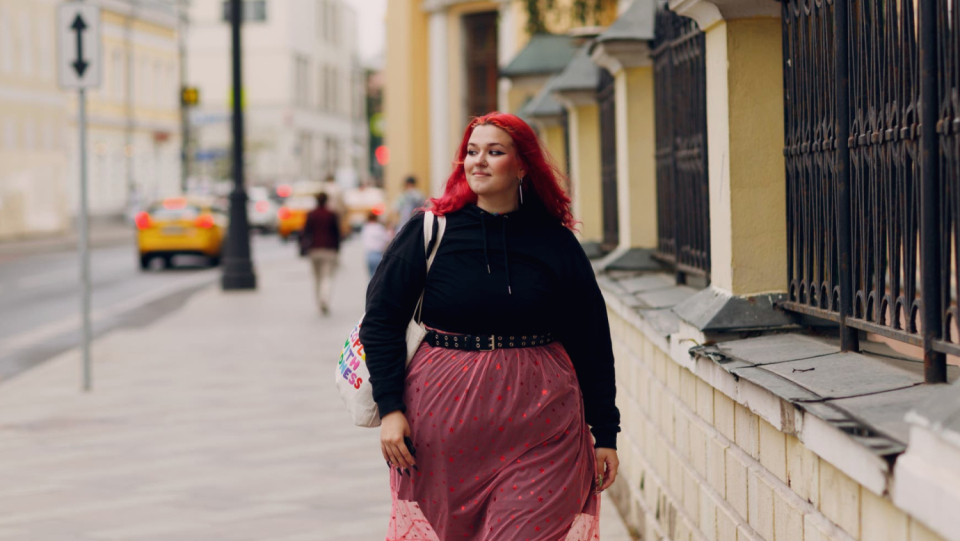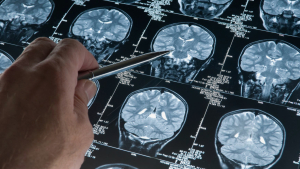Too fat, too small, too big nose: If you get in a bad mood when you look in the mirror, you are not alone. In a survey of 1,000 Germans in 2018, one in three said they were dissatisfied with their own appearance. For many, the quarrel begins in primary school. According to a large German youth study, more than 40 percent of girls and 30 percent of boys find themselves too fat.
The fact that many of us are at war with our bodies is the logical consequence of a culture of constant diets, fitness craze and social media feeds that constantly show us flawless beauty. We compare ourselves to models who don't even look like they do in their photos. The contrast with an average body was rarely greater. This gives many the impression of not being beautiful enough. That makes me unhappy - but how can this be changed?
As early as the late 1960s, some Americans were fed up with hunger.
Influenced by feminism and the African American civil rights movement, they called for an end to "fat shaming", that is, the discrimination against fat people, and founded the National Association to Advance Fat Acceptance.
In doing so, they laid the foundation stone for the body positive movement: it is committed to accepting all kinds of body-regardless of whether they correspond to the usual beauty criteria.
It is no longer just about weight, but also about other supposed flaws such as folds, scars, bald or strong body hair.
Meanwhile, body positivity has penetrated at least into a few corners of the mainstream: companies like Dove and Calvin Klein advertise with variety, also in terms of the physique of their models, and in advertising no longer just legs that are already clean-shaven are shown. Under the hashtag #bodypositivity, there are more than ten million photos on Instagram showing people with a body outside the norm.
Researchers also devote themselves to the area. If the relationship with your own body was only an issue for a long time, if, such as the anorexia has become pathological, you are now also interested in what psychologists understand by the "body image" (in English: body image). It is considered an important pillar of our self -esteem.
"Body image is directly linked to our psychological well-being," says Phillippa Diedrichs on the BBC's Science Focus Podcast. She is Professor of Psychology at the University of the West of England in Bristol and heads the Centre for Appearance Research. »Those who are dissatisfied with their bodies are more likely to suffer from stress, anxiety and depression. We know that people with a positive body image are more resistant to stress and experience more positive emotions."
Part of our body image is how our body looks to us, how it feels to live in it, and how we evaluate it, for example, as beautiful or ugly. The image that we make of our body does not always correspond to reality. This is how most people, especially women, consider themselves to be fuller than they really are. The image of one's own body can even be pathologically distorted. This is the case, for example, with anorexic people, who often feel fat despite being underweight. To perceive oneself as extremely ugly is a psychiatric diagnosis of one's own: people with the so–called body dysmorphic disorder consider their appearance – often their face - to be disfigured.
What is behind the distorted body image? The foundation for whether we like our appearance is often laid in childhood, and the picture solidifies during puberty. Various factors play a role here, including the ideals of beauty that prevail in a society. If lush bodies were still celebrated in the baroque, today the thinning is considered a nonplusultra in the western world. In the past few years, slim body with a large bottom of La Kim Kardashian has been trendy.
"Social media have a major influence on young people in particular," says child and adolescent psychiatrist Florian Hammerle from the University of Mainz. Among other things, he treats young people with eating disorders and researches their body image. "The decisive factor is how much they have internalized the current ideal of beauty and associate a certain body with happiness or popularity, for example." Teenagers who are generally not doing well and who do not have a stable social network are particularly susceptible to corresponding pictures on Instagram and Co. On the other hand, it is protective if self-esteem is also fed by sources other than appearance, for example good grades, a talent for sports or social commitment.
But it's not just the media that shapes our body image. The way early caregivers deal with their bodies also has an influence. If mom and dad constantly pinch their belly fat critically in front of the mirror, this can serve as a bad role model. The comments of peers are also important. For example, anyone who was teased for his sailing ears as a child is more likely to run the risk of quarreling with his appearance. Personality also plays a role: those who are perfectionist, often compare themselves with others, have low self-esteem or tend to look at themselves through the eyes of others are more likely to have a negative image of their own body.
How a negative body image affects
"If people are dissatisfied with their body, this can have negative consequences for their health. They are more likely to develop a disturbed eating behavior and often do extremely much or very little sport, " Phillippa Diedrichs reports to the BBC. "Especially in adolescents, a negative body image may be associated with substance abuse.«
Love life can also suffer. Anyone who is unsure about their appearance is more afraid to get involved in a date, as a British study showed in 2021. Conversely, people who are satisfied with their exterior dare to do more and they live healthier.
But can the body positivity movement actually promote a healthy body image? This question was asked by a research group from England and Australia in 2019. Psychologist Rachel Cohen and her team wanted to know what effect appropriate images and messages have on young women. For this, they submitted 20 Instagram posts each to 200 adults between the ages of 18 and 30. One group was shown only photos of slim and well-trained models, for example Kendall Jenner or Gigi Hadid. The other group instead looked at posts from the body positivity community, in which women who do not meet the standard ideal of beauty proudly present their bodies. Among them were, for example, pictures of the influencer Megan Jayne Crabbe, who shows her curves to encourage others. A third group was not presented with pictures of bodies at all, but of landscapes and animals. All participants completed a series of questionnaires before and after.
The result: The Body Positivity Posts and the Nature Images improved the mood of women, but the model photos, on the other hand, fell on the mood. Anyone who had looked at Megan Jayne Crabbe and Co posts was also more satisfied with their own body and appreciated more - on the contrary, the women who had looked at pictures of slim models.
A study by Mainz psychotherapist Florian Hammerle and his colleagues also shows how great the influence of culture and media is. They compared the body image of more than 1000 young people from Germany and Colombia. While slim is considered beautiful in Western Europe, Latinas are allowed to be curvy. The women who appear in TV series and commercials in Colombia are therefore often less thin than here in the country. And the more realistic ideal of beauty was also reflected in the body image: On average, the Colombian respondents had a more positive relationship to their own bodies than the Germans. They were less ashamed to show him in the outdoor pool, as the comparison showed.
The results have not yet been published, but they coincide with other works on feelings of shame and dissatisfaction with one's own body. In order to clarify whether the more relaxed attitude is the result of the widespread ideal of beauty, even more research is needed. But it could be a factor, Hammerle says.
Does Body Podiatry get in the way of a healthier life?
Body positivity finds a lot of support in research. But there are also critical voices: are the images of overweight models in advertising possibly counterproductive? After all, severe overweight is considered unhealthy. Those who are dissatisfied with this might be more willing to eat healthier and move more, according to the assumption. So does body positivity harm health?
No, says Claudia Luck-Sikorski, professor of mental health and psychotherapy at the SRH University of Health in Gera. She researches the social and psychological consequences of obesity and says: Attempts to get people through fat shaming to eat less and do more sport have failed.
"For some people, it's much harder to stay slim because of their genes. Even after successful obesity treatment, most sufferers are still fat," says Claudia Luck-Sikorski. Those who manage to accept their body ultimately live healthier lives than someone who constantly looks at themselves with disgust. Unfortunately, many of those affected have internalized the prejudices that constantly confront them.«
Self-hatred is not a good motivator for a healthier life. On the contrary, stigmatization can promote stress eating and reduce the desire to exercise. This was shown by Rebecca Puhl and Young Suh from the Rudd Center for Food Policy and Obesity in Connecticut in a review paper. Unsolicited diet tips, contemptuous glances and exclusion are also proven to have an impact on the psyche, as an evaluation of more than 100 studies suggests. Those who experience a lot of discrimination are more likely to suffer from depression, anxiety and eating disorders. On the other hand, those who are satisfied with their figure tend to stay healthy.
How Body Podiatry can succeed
To look at one's own body benevolently, to accept it, perhaps even to love it: this is easier said than done. Although there are a number of effective interventions (see "Tips for more self-love"), as noted by a research group from the Netherlands, England and the USA. In her meta-analysis, she observed an effect on body image, ideal of beauty and the tendency to compare oneself with other people. But not all people benefit from it.
For some, the call to Body Positity builds up pressure. Therefore, an approach called »Body Neutrality« goes one step further. He directs the focus away from the external appearance. According to the motto "My body carries me through life - what it looks like is secondary."
Having a healthy body image does not mean that you always have to feel completely beautiful, explains Phillippa Diedrichs. "It's about having respect for your own body, appreciating it." If love does not work, then at least make peace.



















